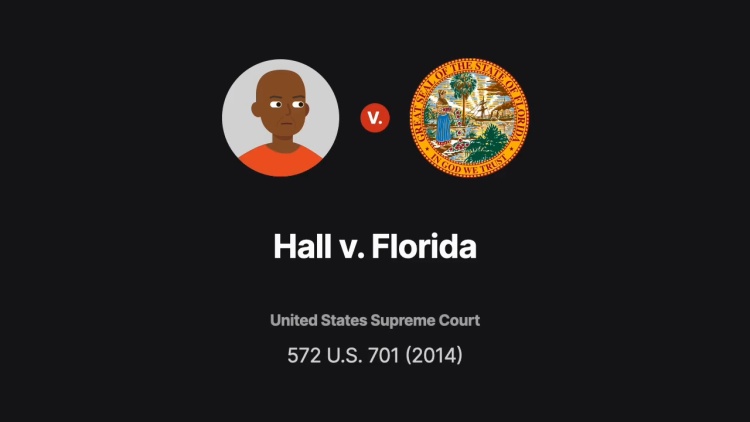Hall v. Florida
United States Supreme Court
572 U.S. 701 , 134 S.Ct. 1986, 188 L.Ed.2d 1007 (2014)
- Written by Robert Cane, JD
Facts
Freddie Hall (defendant) was found guilty of murder for the killing of Karol Hurst and sentenced to death. Hall and an accomplice had kidnapped, beaten, raped, and killed Hurst who was pregnant at the time of her death. Hall’s original death sentence for murder was overturned because he had been barred from presenting evidence of his intellectual disability because it was considered nonstatutory mitigating evidence. Hall was resentenced. This time, Hall was permitted to present evidence of his intellectual disability. Hall had an IQ of 72. Despite the sentencing judge finding that Hall was mentally retarded, Hall was sentenced to death a second time. Hall moved to set aside his death sentence, which was denied. The Florida Supreme Court affirmed the denial. Florida law foreclosed consideration of intellectual disability as a mitigating circumstance for all defendants deemed to have an IQ above 70. Hall appealed, arguing that Florida’s strict IQ cutoff failed to consider other evidence of intellectual capacity and did not recognize the imprecise nature of IQ tests by ignoring the standard error of measurement (SEM). Thus, the cutoff violated the Eighth Amendment to the United States Constitution’s prohibition on the execution of persons with intellectual disabilities. The United States Supreme Court granted certiorari.
Rule of Law
Issue
Holding and Reasoning (Kennedy, J.)
Dissent (Alito, J.)
What to do next…
Here's why 907,000 law students have relied on our case briefs:
- Written by law professors and practitioners, not other law students. 47,100 briefs, keyed to 996 casebooks. Top-notch customer support.
- The right amount of information, includes the facts, issues, rule of law, holding and reasoning, and any concurrences and dissents.
- Access in your classes, works on your mobile and tablet. Massive library of related video lessons and high quality multiple-choice questions.
- Easy to use, uniform format for every case brief. Written in plain English, not in legalese. Our briefs summarize and simplify; they don’t just repeat the court’s language.





